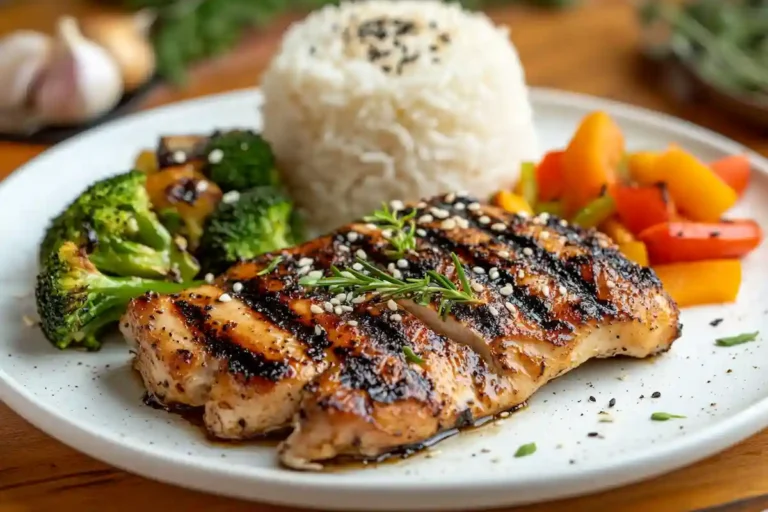Introduction
Chicken breast has long been touted as one of the healthiest protein sources, recommended by nutritionists, dieticians, and fitness enthusiasts alike. But is chicken breast healthy in the grand scheme of a balanced diet? This article takes an in-depth look at chicken breast, analyzing its nutritional value, health benefits, potential drawbacks, and offering a balanced perspective on its place in a healthy diet. Whether you’re a bodybuilder or just someone trying to eat well, understanding the answer to “Is chicken breast healthy?” is worth your time.
1. Nutritional Profile of Chicken Breast
When we ask, “Is chicken breast healthy?” it often boils down to its nutritional composition. Chicken breast is a lean, white meat that is rich in protein while being low in fat, especially when the skin is removed. For a 100-gram serving of skinless, boneless cooked chicken breast, the approximate nutritional values are:
- Calories: 165 kcal
- Protein: 31 grams
- Fat: 3.6 grams
- Carbohydrates: 0 grams
These numbers highlight why chicken breast is considered a go-to food for those looking to build muscle or lose weight. It provides high-quality protein with minimal calories, aiding in muscle repair and growth without an excessive intake of fats or carbohydrates. Besides protein, chicken breast also contains essential nutrients like vitamins B3 (niacin) and B6, phosphorus, and selenium, all of which support various bodily functions.
Nutritional Content (Per 100g)
| Nutrient | Approx. Amount |
|---|---|
| Calories | 165 kcal |
| Protein | 31 g |
| Fat | 3.6 g |
| Carbohydrates | 0 g |
| Vitamin B3 (Niacin) | ~14.8 mg |
| Vitamin B6 | ~0.5 mg |
| Phosphorus | ~220 mg |
| Selenium | ~31 µg |
2. Health Benefits of Chicken Breast
High-Quality Protein Source for Muscle Growth
One of the reasons people ask, “Is chicken breast healthy?” is its protein content. Chicken breast contains all nine essential amino acids that our bodies need. These amino acids are crucial for muscle growth and repair, making chicken breast a favorite among athletes and bodybuilders. A protein-rich diet is also beneficial for older adults who need to maintain muscle mass.
Low in Saturated Fat
Compared to other protein sources like red meat, chicken breast has significantly lower levels of saturated fats. Since saturated fat can lead to increased cholesterol levels and a higher risk of cardiovascular disease, choosing skinless chicken breast helps reduce these risks. If you’re wondering, “Is chicken breast healthy for the heart?”—the answer is generally yes, as it is a leaner option.
Rich in Essential Vitamins and Minerals
Chicken breast is a good source of several vitamins and minerals. Vitamin B6 and niacin are particularly important for converting food into energy, promoting healthy brain function, and supporting the immune system. Selenium, another nutrient found in chicken breast, plays a role in maintaining thyroid health and combating oxidative stress.
Supports Weight Management
A common question—“Is chicken breast healthy for weight loss?”—can be answered by its high protein and low-calorie profile. Protein increases feelings of fullness, which can help reduce total calorie intake and support weight management. A diet rich in protein also helps prevent the loss of muscle mass during a calorie deficit, ensuring that weight loss primarily comes from fat.
Heart Health Benefits
Lean protein sources like chicken breast can be part of a heart-healthy diet. With low levels of saturated fat, chicken breast is a preferable choice compared to fatty cuts of beef or pork. Incorporating chicken breast into a diet rich in vegetables, whole grains, and healthy fats may help reduce the risk of cardiovascular diseases.
3. Potential Drawbacks of Chicken Breast
Risk of Overconsumption
Although the answer to “Is chicken breast healthy?” is usually yes, overconsumption of any single food can lead to imbalances in nutrient intake. Since chicken breast lacks fiber and some essential nutrients found in a varied diet, eating it exclusively or in large quantities might cause nutritional deficiencies over time.
Quality Concerns
Not all chicken breasts are created equal. The quality of the chicken depends on how the bird was raised. Many commercially available chicken breasts come from birds that have been given antibiotics or fed suboptimal diets. Opting for organic or free-range chicken can reduce exposure to potentially harmful additives and may provide better nutrient content.
Cooking Methods Matter
The health benefits of chicken breast also depend on its preparation. Frying or cooking it with heavy creams and sauces can significantly increase the fat and calorie content, counteracting its lean profile. Grilling, baking, poaching, or steaming are much healthier ways to prepare chicken breast.
4. Is Eating Chicken Breast Every Day Healthy?
Many individuals focused on protein intake—like athletes or bodybuilders—may consume chicken breast every day. While is chicken breast healthy to eat daily? It can be, but balance remains crucial. Chicken breast is low in fat and a great source of protein, but relying on it exclusively may lead to a lack of dietary variety, which is essential for obtaining a broad spectrum of nutrients.
5. The Role of Chicken Breast in Popular Diets
Keto Diet
In the ketogenic diet, which emphasizes high-fat, low-carb eating, chicken breast can be included due to its high protein and nearly zero carbohydrate content. Those on keto might add healthy fats to balance their macros. Still, they might ask, “Is chicken breast healthy when you need more fat?”—in this case, fattier cuts or added oils can help meet keto requirements.
Paleo Diet
The paleo diet focuses on whole foods similar to what our ancestors would have eaten. Since chicken breast is unprocessed lean meat, it fits well. When combined with vegetables, fruits, nuts, and seeds, chicken breast can be an excellent protein choice for paleo followers who want to answer “Is chicken breast healthy in a paleo lifestyle?”
Low-Calorie and Weight Loss Diets
Chicken breast is often recommended in weight-loss diets due to its high protein and low-calorie profile. It helps keep you feeling full, aiding in maintaining a caloric deficit. So if you’re asking, “Is chicken breast healthy for losing weight?”—it typically is, especially when paired with nutrient-dense sides.
Mediterranean Diet
The Mediterranean diet promotes lean meats in moderation. Chicken breast, when grilled or baked with herbs, can seamlessly fit into this heart-healthy meal plan. For those curious, “Is chicken breast healthy when trying to follow a Mediterranean-style eating plan?”—the answer is yes, especially if balanced with vegetables, whole grains, and healthy fats like olive oil.
6. Different Cooking Techniques for Healthier Chicken Breast

Grilling
Grilling chicken breast is a healthy cooking method that requires little to no added fat. Be mindful to avoid charring or burning, as this can create harmful compounds. A simple herb marinade can enhance flavor while keeping the dish healthy for anyone wondering, “Is chicken breast healthy when grilled?”
Baking
Baking chicken breast is another healthy option, particularly if you season it with herbs and spices rather than breading it. Adding vegetables to the baking dish creates a flavorful and nutritious meal that helps address the question, “Is chicken breast healthy when baked?”
Poaching
Poaching is a gentle cooking method that keeps chicken breast moist without adding extra fat. Cooking it in seasoned broth imparts flavor, making it a great option for salads, soups, or sandwiches. If you’ve been asking, “Is chicken breast healthy if I avoid frying?”—poaching is a prime example.
Stir-Frying
Stir-frying chicken breast with a mix of vegetables and minimal oil can produce a quick, balanced meal. Using healthy oils like olive oil in moderation ensures the dish remains nutritious, which often reassures those who wonder, “Is chicken breast healthy if stir-fried properly?”
7. The Impact of Chicken Breast on Muscle Growth and Athletic Performance
For individuals engaged in strength training or athletic performance, adequate protein intake is crucial. Is chicken breast healthy for muscle repair? Absolutely. It provides a complete protein that helps with muscle repair and growth. Research suggests that consuming sufficient protein after exercise supports muscle protein synthesis and prevents muscle breakdown. Chicken breast is also rich in leucine, an essential amino acid crucial for initiating muscle repair.
8. Is Chicken Breast a Superfood?
The term “superfood” typically refers to nutrient-rich foods that offer extraordinary health benefits. Is chicken breast healthy enough to be called a superfood? While it may not be as antioxidant-rich as berries or leafy greens, it does possess several “super” qualities:
- High in Lean Protein: Contains essential amino acids for muscle and immune support.
- Rich in Micronutrients: Vitamins like B6 and niacin contribute to vital bodily functions.
- Adaptable to Multiple Diets: Supports weight loss, muscle gain, and general health.
9. Is It Healthy to Just Eat Chicken Breast?
Relying solely on chicken breast for protein can result in missing out on other essential nutrients. So if you ask, “Is chicken breast healthy as my sole protein source?”—the short answer is no, because variety is vital. Fatty fish like salmon provides omega-3 fatty acids, while plant-based proteins like lentils or quinoa supply fiber and other nutrients. A diverse diet is key to overall health.
10. Quality Matters: Organic vs. Conventional Chicken Breast
Choosing organic or free-range chicken breast can influence health outcomes. Is chicken breast healthy if it’s not organic? It can still be, but organic chicken is raised without antibiotics or added hormones, reducing potential exposure to these substances. Free-range chicken often has a more varied diet, which may result in slightly higher nutrient content. Although pricier, the nutritional and environmental benefits may be worthwhile for many.
11. The Link Between Chicken Breast and Heart Health
Is chicken breast healthy for the heart? Because it’s low in saturated fats, chicken breast is often recommended for heart health. Diets high in saturated fats can raise cholesterol levels and increase the risk of heart disease. Substituting chicken breast for higher-fat proteins like beef or pork can help reduce overall cholesterol levels. Moreover, B vitamins in chicken breast help regulate homocysteine, an amino acid linked to heart disease risk.
12. Can Chicken Breast Be Part of a Plant-Forward Diet?
Many people are adopting a plant-forward diet, where they still consume animal products but focus primarily on plant foods. Is chicken breast healthy in this approach? Absolutely, when used in moderation. If you use chicken breast to complement a vegetable-rich plate, you maintain the plant-based focus while adding a source of high-quality protein.
13. Tips for Choosing and Preparing the Healthiest Chicken Breast
- Look for Quality Labels: Opt for organic, free-range, or antibiotic-free chicken where possible.
- Trim Visible Fat: Removing visible fat helps keep chicken breast lean.
- Use Marinades Wisely: Choose citrus, herbs, and spices over heavy sauces to avoid unnecessary calories.
- Avoid Overcooking: Cook to an internal temperature of 165°F (74°C) for safety without drying it out.
- Pair with Nutrient-Dense Sides: Combine with leafy greens, quinoa, or roasted vegetables to address the question, “Is chicken breast healthy in a balanced meal?”
14. FAQs About Chicken Breast
Is chicken breast really healthier?
Yes. Is chicken breast healthy compared to red meat or fattier cuts? Indeed, it is leaner and contains essential nutrients like B vitamins and selenium. Its lower saturated fat content makes it a heart-healthier choice than many other meat options.
Is it healthy to just eat chicken breast?
Chicken breast is a nutritious source of lean protein, but is chicken breast healthy as your only protein source? Not exactly, because variety in the diet is crucial. Relying solely on chicken breast can lead to missing out on fiber, omega-3 fatty acids, and other nutrients found in diverse protein options.
Is canned chicken breast healthy?
Canned chicken breast can be convenient. However, you might ask, “Is chicken breast healthy if it’s canned?” It depends on the brand and added ingredients. Some canned versions contain high sodium or preservatives. Look for brands with minimal additives and low sodium content, and consider rinsing before use.
Is chicken breast a superfood?
While typically not labeled a superfood like blueberries or kale, many still wonder, “Is chicken breast healthy enough to earn that title?” It’s a “super” source of lean protein, essential amino acids, and micronutrients like niacin and selenium. Its versatility and role in muscle growth, weight management, and overall health give it near-superfood qualities.
Conclusion
So, is chicken breast healthy? In most cases, yes. Chicken breast is a highly nutritious, versatile, and accessible protein source that offers numerous benefits, from muscle repair to heart health support. Its high-quality protein, low-fat content, and essential micronutrient profile make it a staple in many healthy diets. Still, moderation and variety are key. By including other nutrient-dense foods and preparing chicken breast in healthy ways, you can confidently answer “Is chicken breast healthy?” with a resounding yes while maintaining a balanced, well-rounded diet.
Print
Juicy Oven-Baked Chicken Breast
- Total Time: 35 minutes
- Yield: 4 servings 1x
Description
Discover the secret to perfectly juicy and flavorful chicken breasts with this simple oven-baked recipe. Ideal for meal prep or a quick weeknight dinner, these chicken breasts are seasoned to perfection and baked to a tender finish.
Ingredients
- 4 boneless, skinless chicken breasts
- 2 tablespoons olive oil
- 1 teaspoon garlic powder
- 1 teaspoon paprika
- 1 teaspoon salt
- 1/2 teaspoon black pepper
- 1 lemon, thinly sliced
- 1 tablespoon unsalted butter, cut into small pieces
Instructions
- Preheat Oven: Set your oven to 450°F (230°C).
- Prepare Chicken: Pat the chicken breasts dry with paper towels.
- Season: In a small bowl, mix olive oil, garlic powder, paprika, salt, and black pepper. Rub this mixture evenly over both sides of each chicken breast.
- Arrange in Baking Dish: Place the seasoned chicken breasts in a baking dish, ensuring they are not touching. Lay lemon slices around the chicken and place a small piece of butter on top of each breast.
- Bake: Bake in the preheated oven for 20-25 minutes, or until the internal temperature reaches 165°F (74°C).
- Rest: Remove from the oven and let the chicken rest for 5 minutes before serving.
Notes
- Serving Suggestions: Pair with roasted vegetables, a fresh salad, or your favorite whole grain for a balanced meal.
- Storage: Store leftovers in an airtight container in the refrigerator for up to 4 days.
- Reheating: To maintain juiciness, reheat gently in the oven at 300°F (150°C) until warmed through.
- Prep Time: 10 minutes
- Cook Time: 25 minutes
- Category: Lunch
- Method: Baking
- Cuisine: American
Nutrition
- Serving Size: 1 chicken breast
- Calories: 220
- Sugar: 0g
- Sodium: 600mg
- Fat: 12g
- Saturated Fat: 4g
- Carbohydrates: 1g
- Fiber: 0g
- Protein: 26g
- Cholesterol: 85mg
Keywords: oven-baked chicken breast, juicy chicken recipe, easy weeknight dinner

